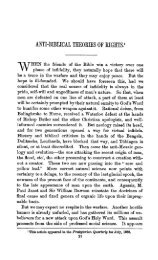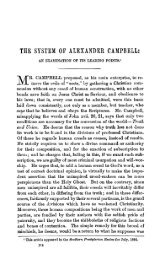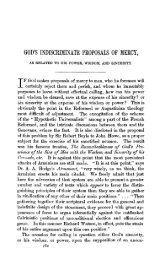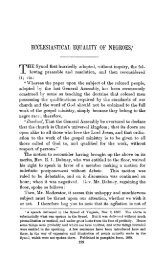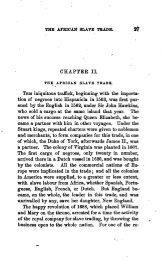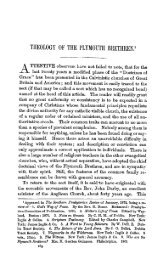The Latest Infidelity.pdf 487KB May 19 2009 - R.L. Dabney Archive
The Latest Infidelity.pdf 487KB May 19 2009 - R.L. Dabney Archive
The Latest Infidelity.pdf 487KB May 19 2009 - R.L. Dabney Archive
Create successful ePaper yourself
Turn your PDF publications into a flip-book with our unique Google optimized e-Paper software.
510 THE LATEST INFIDELITY.<br />
administrative reason for God's dealing: that he was planning<br />
to preserve a pure religion and morality in Israel, which re-<br />
quired their effectual protection from the contamination of this<br />
pagan example.<br />
Third, Colonel Ingersoll himself has been in the habit of<br />
attacking the Bible passionately, because he found that, when<br />
candidly explained, it countenanced slavery—the Old Testa-<br />
ment actually ordaining it, and the New Testament allowing it.<br />
But inasmuch as slavery appears very abominable to his moral<br />
intuitions, this compels Mm to regard them as wicked books.<br />
Here, again, the critic's whole, difficulty arises out of a sheer<br />
misconception. Let me ask him what that thing is which ap-<br />
pears so evil; he defines it substantially thus: the usurpation<br />
by a stronger individual at his own violent will over the being<br />
of his weaker fellow-man, whereby the victim is reduced from<br />
a human personality, with a moral responsibility and destiny,<br />
to a mere chattel, a brute possession, whose labor, happiness<br />
and very existence may then be exhausted by the usurper for<br />
his own selfish behoof. I am happy to be able to console the<br />
critic by assuring him, first, that everybody else would abhor<br />
such a relation just as he does; and, second, that the two Testa-<br />
ments, instead of ordaining or allowing it, even adjudged it<br />
just as he and I do. And here is the triumphant proof that this<br />
very conception of the usurpation which Colonel Ingersoll er-<br />
roneously supposes to be the conception of slavery, is .precisely<br />
the crime which both Testaments condemn. (As in N. T. the<br />
act.of the andrapodistts, and in O. T. nogebh isft) <strong>The</strong> Bible<br />
abhorred it so much that whilst Moses made only a few crimes<br />
capital he made this one of them; and the New Testament usual-<br />
ly recites it along with the enormous wickednesses that incur<br />
the damnation of hell. What, then, was that relation of human<br />
bondage which Moses ordained and the apostles allowed? Not<br />
the usurpation of a personal will over a fellow-creature, not the<br />
reduction of the bondman from a responsible human person to<br />
a chattel (which injustice is nowhere countenanced or excused<br />
by Holy Scripture, or by any modern Christian that ever I<br />
heard of), but it was wholly another thing, to-wit: the regular<br />
institution, by the legislative sovereignty of the commonwealth,<br />
of a personal and domestic authority for life over the involun<br />
tary labor of the bondman, who was deemed by the law unfitted



